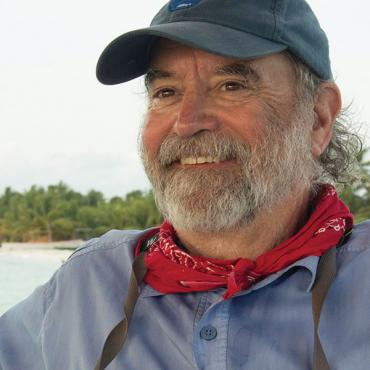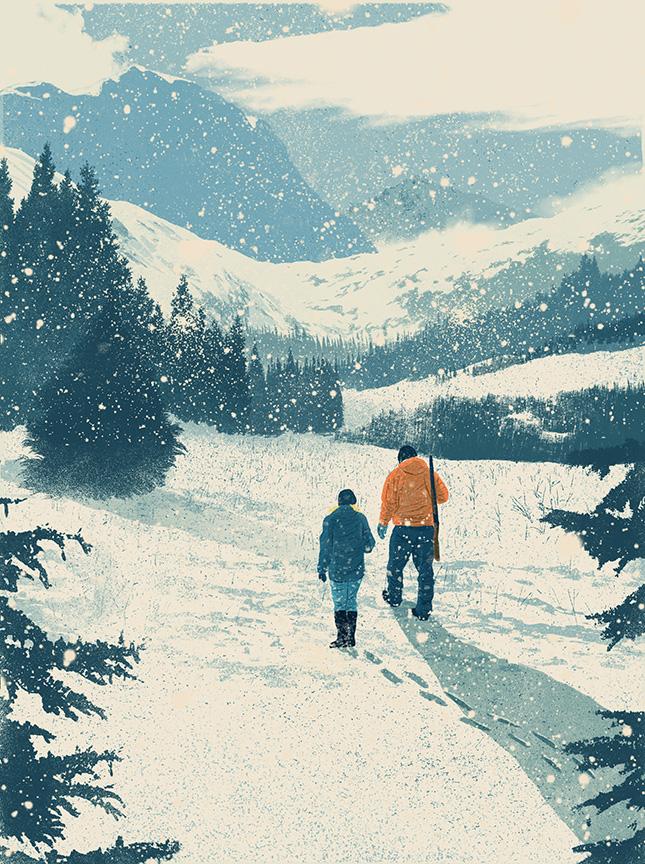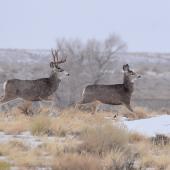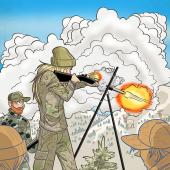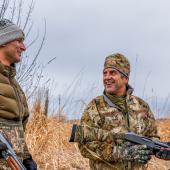Flesh and Blood
The more things change, the more they stay the same.
The leading edge of the storm had just breached the peaks to the west as Matt left the ranch for town, erasing first the stars and then the full moon and finally the hills until he felt as if he were driving through a tunnel. Soon the pickup seemed to be groaning beneath the weight of the season’s first snow.
He didn’t care for airport crowds, but Thanksgiving was a time of transition, with most of the out-of-state hunters gone and the first skiers yet to arrive. As he started across the parking lot, he pulled his worn mackinaw tight for the sprint through the weather to the door. When he shook the snow off inside, he realized he might be the only person in the building whose clothing smelled of horses. The town had changed that much.
He worried that the weather might have delayed her flight. Then a fresh press of underdressed passengers began to spill down the stairs from the arrival gate and there she stood, blonde hair spilling down her shoulders and across a sagging backpack, a familiar grin that lit up the night despite the storm: his daughter Julie, back as if she’d never left at all, as if she’d been gone forever.
She was the first graduate of Sweet Grass High to attend an Ivy League school. The sight of her filled Matt with equal measures of pride and trepidation. Her acceptance back east hadn’t been quite the miracle local school officials and the Chamber of Commerce claimed. She had tested well and her grades were outstanding, even if no one had been fooled by her status as valedictorian of a class of six. Her extracurricular record had done the trick, and not just because she’d won the state title in the 800 twice. Two members of the admissions committee had secretly nurtured the iconic American dream of cowboyhood, and that final resume entry—head wrangler, Diamond-T Ranch—had struck the chord necessary to distinguish her from the next hundred over-achievers vying for the same spot.
“Dad!” she cried as they made eye contact. Her gap-toothed grin—the ranch didn’t produce enough money for cosmetic dentistry—seemed boundlessly enthusiastic half a flight of stairs away. Matt felt his worst fear dissolve: that the alien world she’d entered had somehow taken her away from them. Their embrace drew wistful glances from the crowd as he forgot his concerns and she drank in the familiar smell of his coat: horses and pine trees steeped in fresh mountain air. They stood back and studied each other as if their separation had been measured in years, not months.
“The hell’s that?” he asked as he noticed a glint of light from the side of her nose.
“It’s a stud, Dad,” she replied.
“Well I’ll be damned.”
“Tell me Mom’s fine.”
“She’s cooking back at home right now. Let’s hit the road. Got a foot of snow on the pass and it was just getting started.”
Evening meals had always been events when Julie was growing up, not because Marjorie nurtured pretensions as a chef, but because robust meals provided such fitting conclusions to long working days. After a reunion with her mother punctuated by shrieks of joy and the first tears Matt had seen from her since he couldn’t remember when, Julie announced her intention to visit the horses. Matt tried to dissuade her, invoking weather, darkness, and common sense to no avail. As she donned the heavy fleece-lined coat her mother had left hanging on the porch, her parents stood together a bit closer than necessary and watched her vanish into the night.
“There’s something I need to tell you before we eat,” Julie announced upon her return.
“You become a vegetarian or something?” Matt asked as he pulled his chair back from the head of the table.
“Actually, yes.”
Her father’s easy smile evaporated as he realized she was serious. No one spoke. This was ranch country; this was sacrilege. Marjorie recovered first.
“Is fish meat?” she asked from the doorway to the kitchen.
“No,” Julie replied. “I don’t go that far.”
“Then everything will be fine,” her mother replied. She left the door ajar behind her as she walked to the stove and began to fry the little brook trout she’d taken from the pond at the base of the mountain the day before: food to ease all wounds.
They rose early the following day, Julie because of jet lag, her parents from force of habit. Routine ranch chores consumed the morning, while Julie basked in the horses’ company. Midday, they convened for lunch—split pea soup from which Marjorie had removed most of the ham shank to which it owed its flavor—and discussed plans for the afternoon. Little discussion was necessary. This was the last weekend of deer season, when Julie had headed up the mountain with her father every year since she’d been old enough to ride.
“There’s something I need to tell you about that, too,” she said as she scraped her bowl.
“I can guess,” Matt replied with a sigh. “Good thing you got that scholarship. No one should pay good money so someone can teach you bullshit.”
“Now, honey,” Marjorie said.
“It’s not like that,” Julie continued with the decisiveness of one who has rehearsed the argument. “I’m fine with you hunting. It’s just that I don’t choose to shoot anything myself now.”
“But you’ll still go with me?”
“Of course!”
Matt was already on his feet, planning their route up the mountain through the snow.
She’d wanted to take her horses but he’d talked her out of it, citing dangerous footing. He’d learned years ago that when his daughter and horses were involved, he could only prevail by appealing to matters of equine safety. In fact, he knew a horseback expedition would be loud and cumbersome, and earlier that week he’d spotted a huge old buck high on the mountain that would never stand for a noisy approach. As they parked the truck and headed uphill through the trees, they each carried a backpack frame in case they had to get venison down off the mountain on their backs.
The air lay calm in the wake of the storm’s passage, but the layer of snow underfoot consumed the sound of their footsteps. Matt had composed a list of potential topics to discuss—her course work, city life, the fate of her five classmates—but once they started to climb she lapsed into a hunter’s hush that he felt reluctant to compromise. Or so he told himself—in fact, she was a nineteen-year-old athlete and he was an aging cowboy on foot, and as the mountain’s pitch began to wear against his legs he found himself breathing too hard to let words on any subject emerge.
They hiked for over an hour, Matt setting the pace, Julie too considerate to pass him. The snow held a perfect record of events on the mountainside since the storm had broken, and he used each set of tracks to test her just as he’d done when she was a child. The weather had moved countless mule deer off the ridges, and their sign became too plentiful to arouse comment. But he heard the old excitement in her voice the first time she whispered elk! and he remembered the wide-eyed wonder on her face the afternoon she’d stood over her first dead bull. When they cut a cougar track she insisted that they follow it off the avalanche chute and under the canopy so she could determine the sex of the cat. Which girl did they send back to me? Matt wondered as she bent over to study the prints. The vegetarian or the lion tracker?
Barely an hour of shooting light remained when they reached the basin where Matt had seen the buck. As soon as they paused to glass, he saw deer next to the treeline above. One carried antlers, but his binoculars confirmed that this was not the deer he had come for. He explained as much in quiet tones that disappeared into the snow-laden boughs overhead.
“But I’ll bet that one is!” Julie whispered back. She was right.
“He’s yours if you want,” Matt said as he eased a round into the .270’s chamber.
“No, Dad,” she replied. “I can’t explain… ”
“You don’t have to,” he assured her, and then he took a rest against a stump, enjoyed one last, lingering look at the buck through the scope, and squeezed the trigger. Muffled by the snow, the rifle’s report lacked its usual crack, but the buck began to stagger and moments later it was down at the base of the scree.
Light was draining from the basin by the time they climbed the hill to the deer. Circumstances tempered his appreciation of the buck as he began to consider their exit strategy.
“We could come back in the morning with the horses,” Julie suggested.
“Look at this,” her father explained as he kicked the settling snow underfoot. “It’s starting to melt next to the rocks, and it’s going to freeze tonight. It will be a skating rink up here tomorrow. Besides, you saw all those coyote tracks down in the trees.”
“Then we’ll just have to pack him out tonight!” Julie replied with cheer Matt wished he could share.
They worked together like a pair of surgeons: insides out, hocks off, quick cuts down to the backbone just behind the last ribs. Then Matt twisted while Julie cut, and the carcass fell in two. By the time he had the front quarters lashed to his pack frame, Julie nearly had the hinds secure on hers. Finally, he cinched down the antlers to keep them from swinging against his flanks on the route downhill.
“What about this?” she asked as she toed the liver from the steaming remains. Julie had never enoyed organ meat. Her father loved liver and onions. They’d had endless arguments over the importance of salvaging liver from the field, disputes Matt usually resolved by packing them out over her protest.
“We’ve got enough work ahead now,” he replied.
“You break trail,” Julie said after they discussed the best route off the mountain. “I need to throw another hitch around the hindquarters.” He set off reluctantly, but she caught him ten minutes later. They stumbled down the mountain through the dark together and came out on the track to the truck beneath a brilliant moon, each of them as tired as either could remember.
“Worried?” Matt asked Marjorie when they finally reach the house.
“Not yet,” Marjorie replied.
“Dad shot the biggest buck,” Julie explained as she headed to the kitchen sink to wash the blood from her hands.
“No bigger than my appetite,” Matt observed as he collapsed into the chair beside the stove and began to tug at his bootlaces. “What’s cooking?”
“Home fries,” Marjorie replied. “Spinach salad, fresh baked bread, tomato soup.”
“God almighty,” Matt groaned. “Couldn’t we have some meat?”
“But Julie…”
“You never have to do anything special on my account, Mom,” their daughter interrupted. “Besides, I almost forgot.” After a quick trip to the porch she reappeared, a glistening, tawny lump in each hand: two slabs of venison liver she’d packed off the mountain in her coat pockets.
“I can’t believe it,” Matt said. “After all those arguments.”
“Believe it, Dad. It’s my present to you.” She turned and headed back to the kitchen, the liver leaving a blood trail across the floor. “Come on, Mom,” she continued. “There have to be some onions somewhere.”
As he listened to the two of them rattle pots in the kitchen, he realized he’d trade anything for the meal ahead: the deer’s rack, its loins, the ranch itself—whatever it took to keep her part of them.
The original version of this story appeared in Gray’s Sporting Journal.

